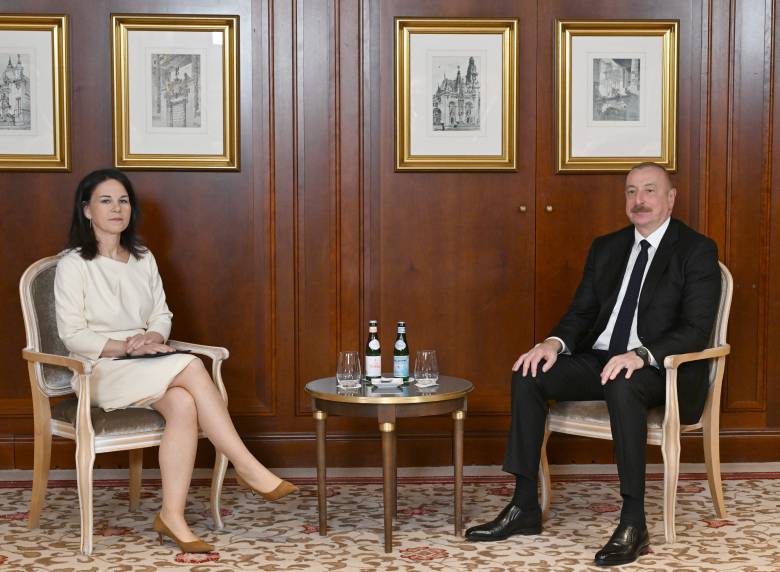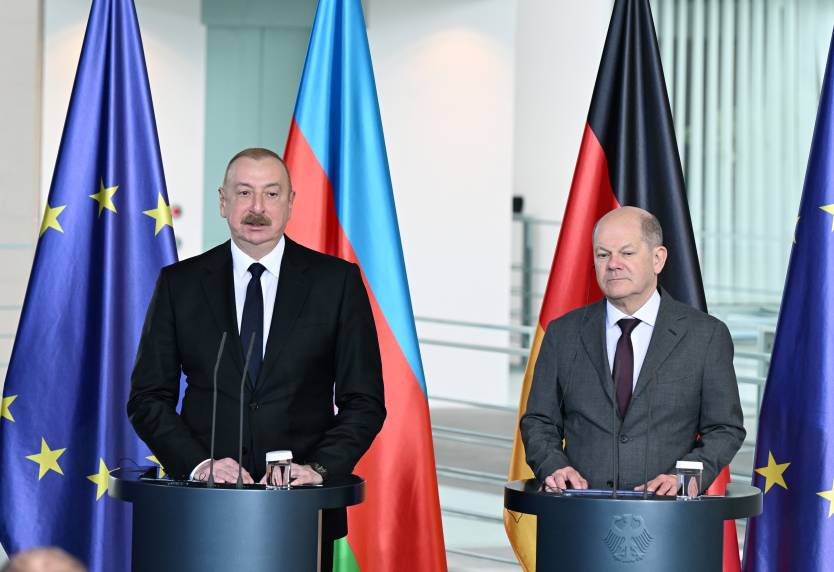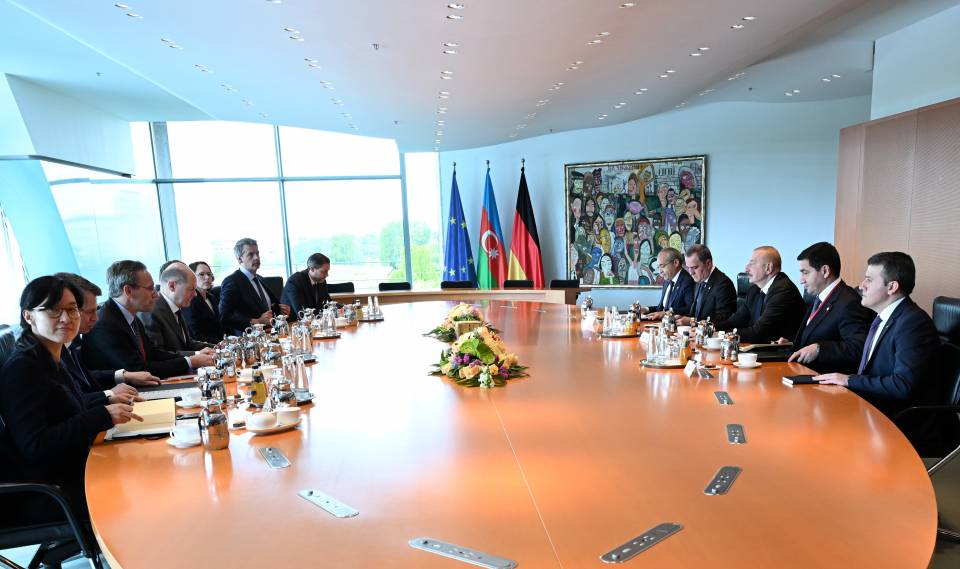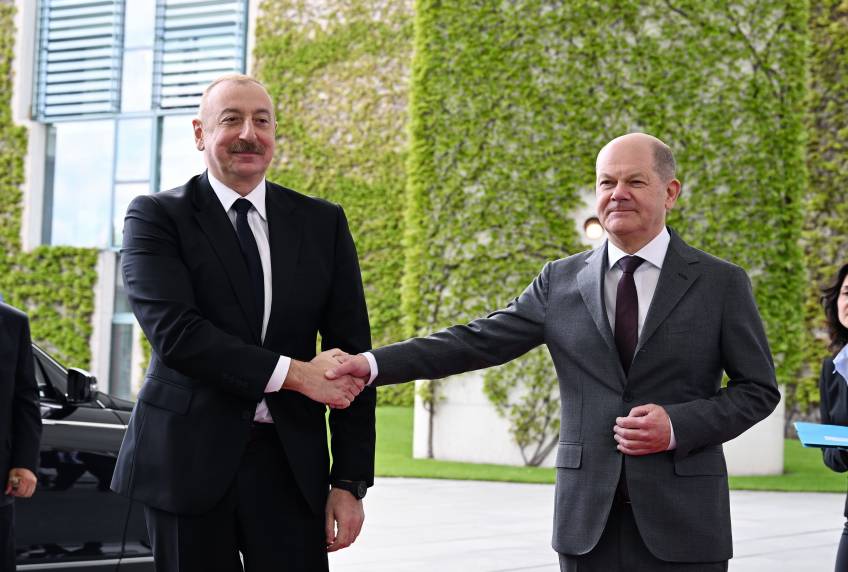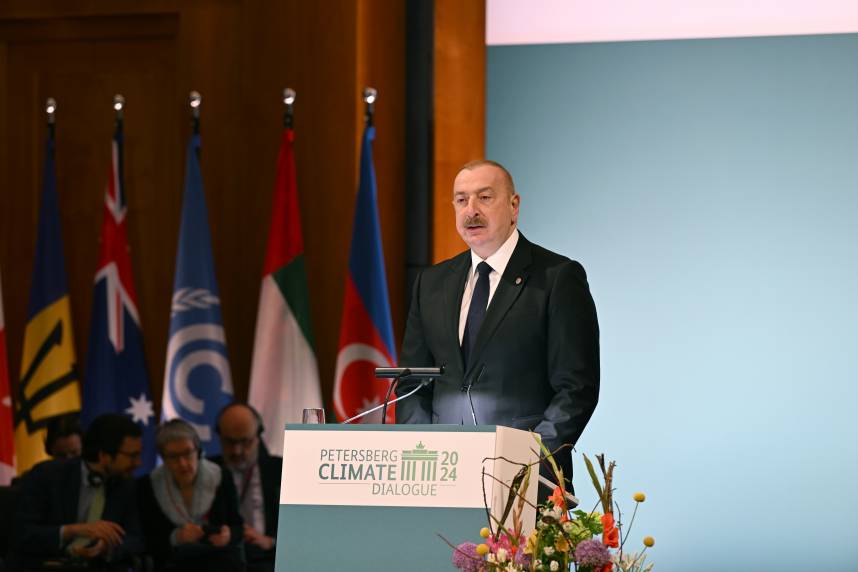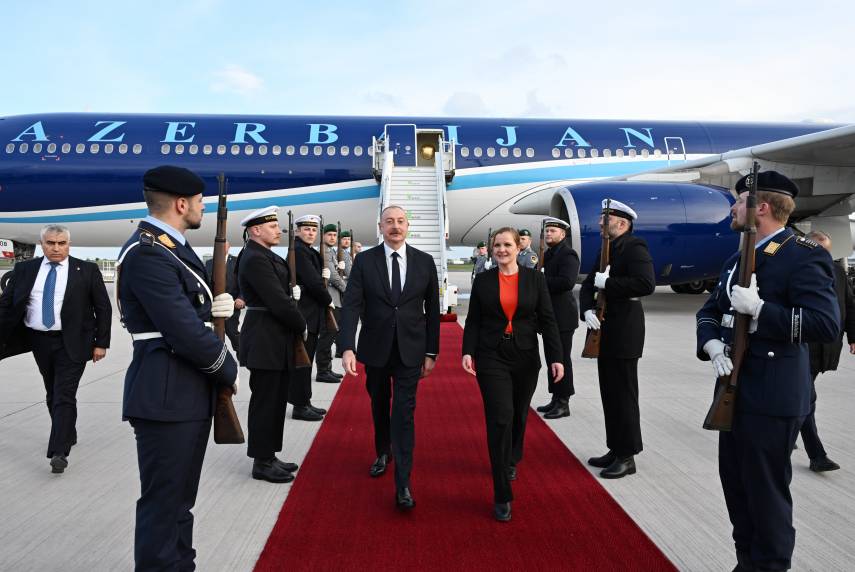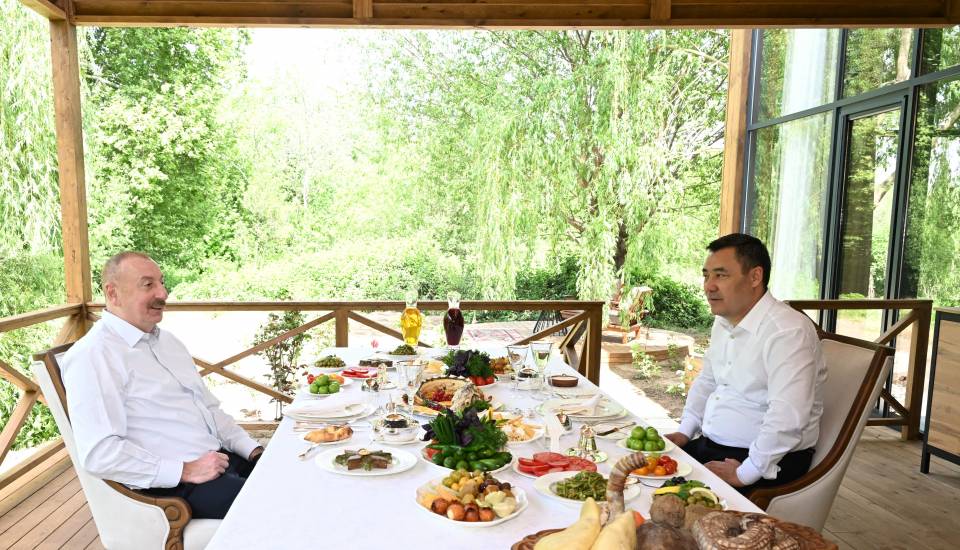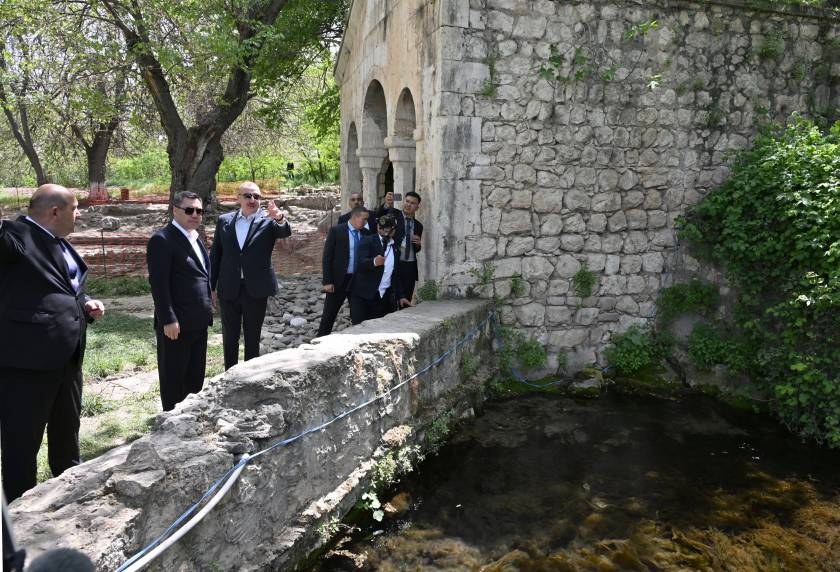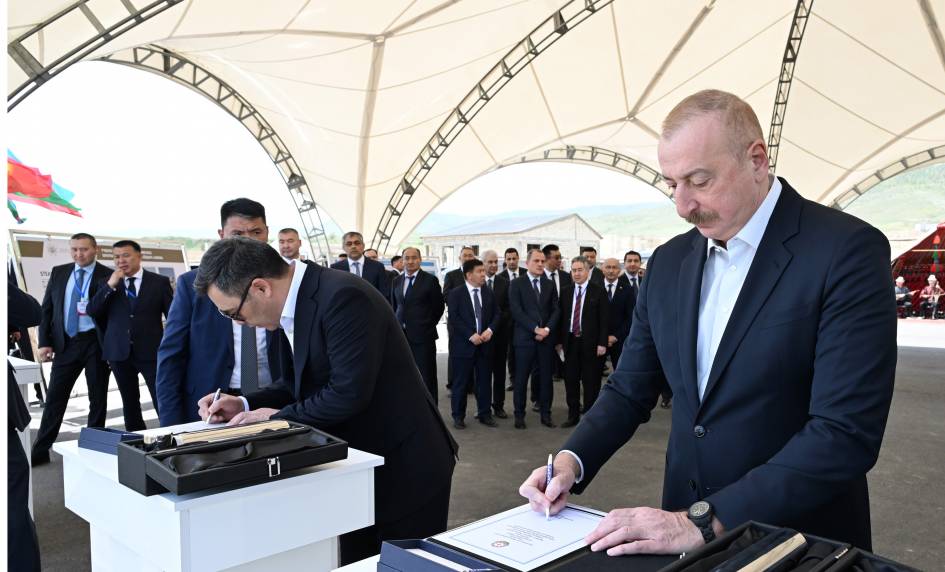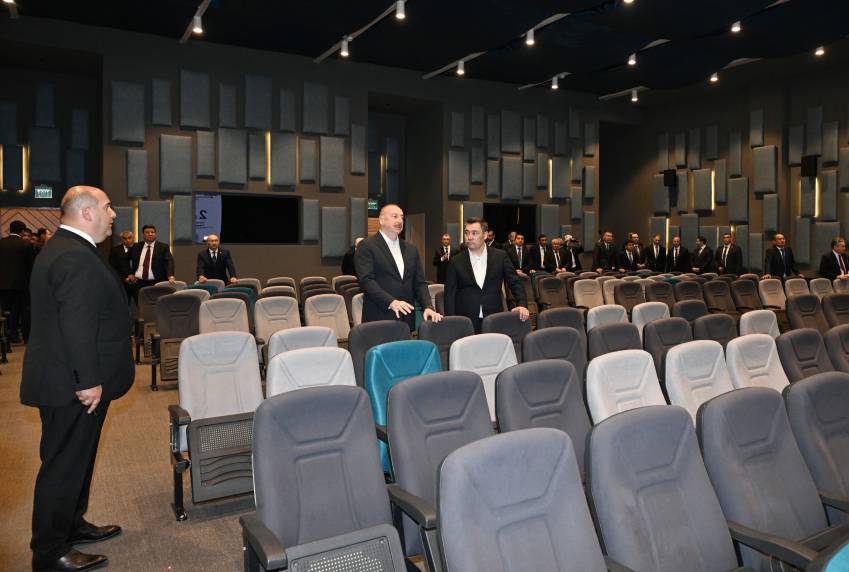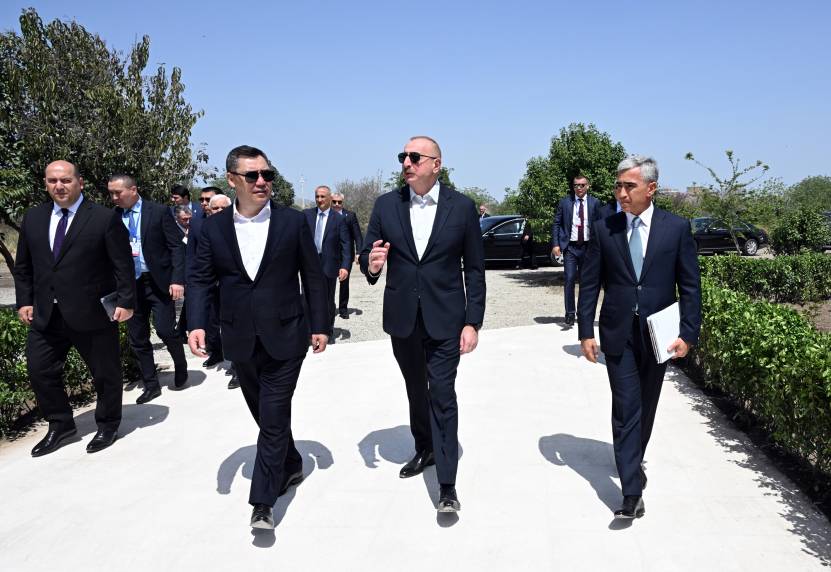17:14
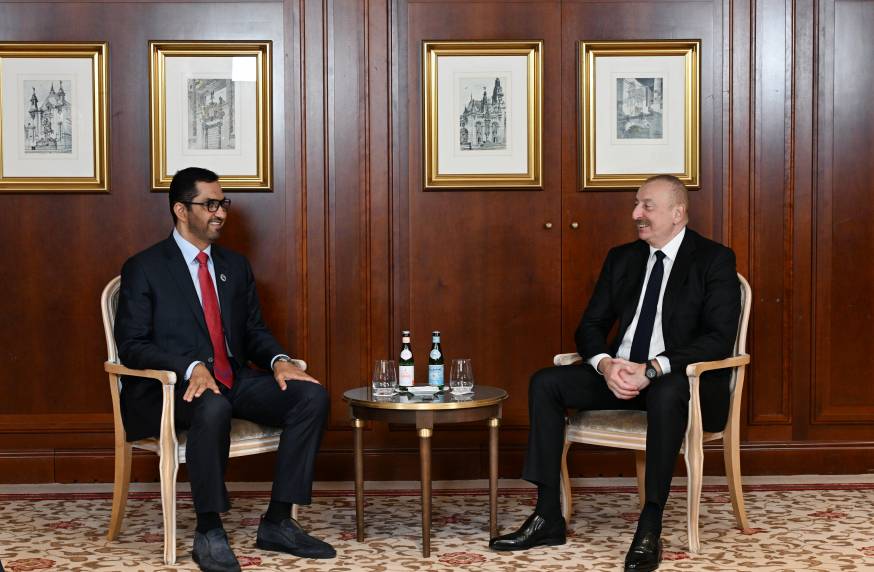
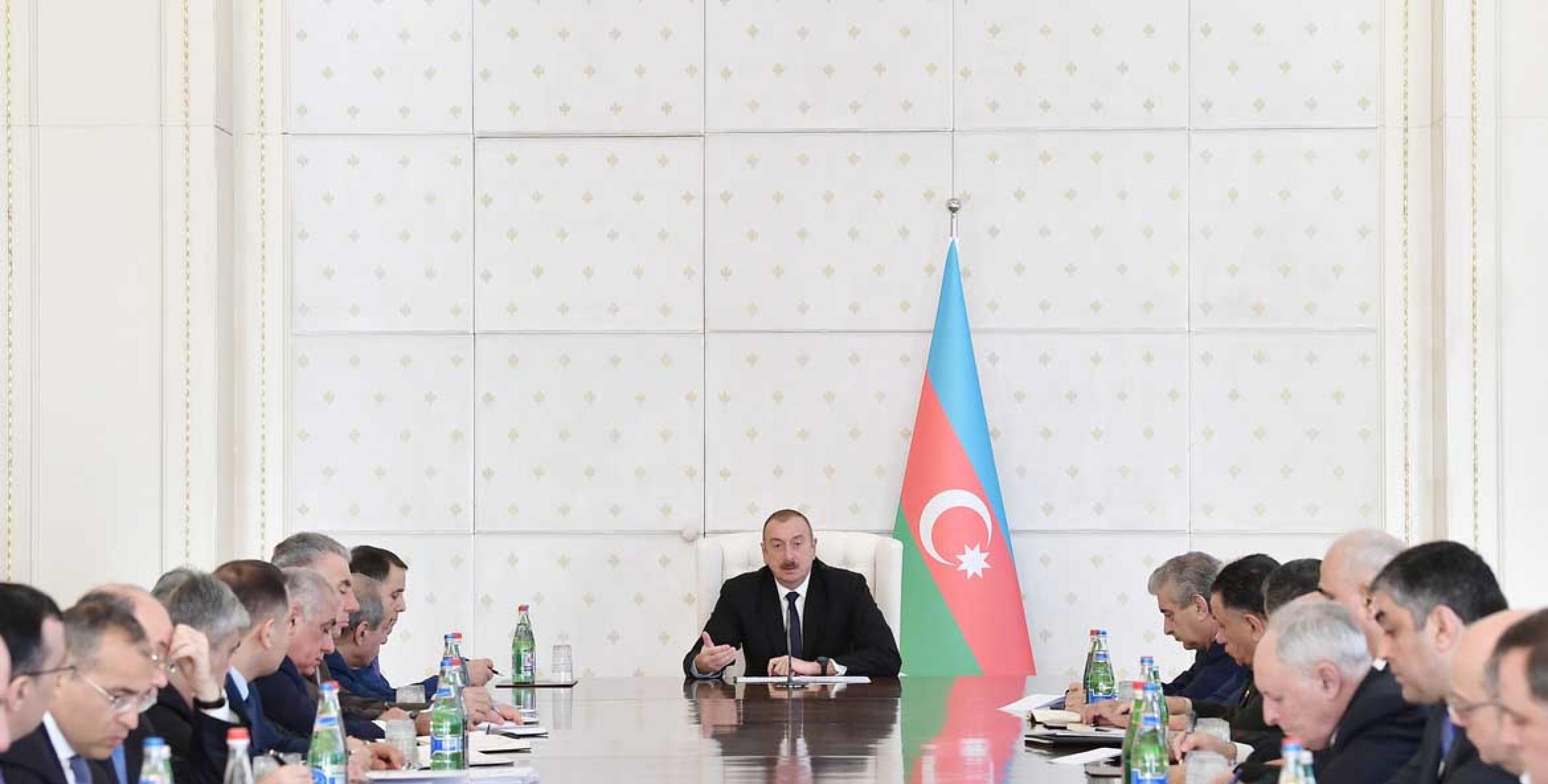
I am sure that we will fulfill all the tasks ahead of us in 2019 as well. This year will also be successful for our country. In my opening remarks, I mentioned that last year was one of profound reforms, and they manifested themselves in a matter of one year. Of course, they will manifest themselves even more in the coming years. Of particular importance are reforms in the spheres of tax and customs. The recovery process in these areas is producing excellent results. Our financial capacity is expanding. The work done, the reforms that have already been carried out will largely manifest themselves this year.
It was noted here that as a result of the reforms carried out in the customs area, we managed to significantly increase our budget. Last year, we made adjustments and increased our budget to do some additional work. Additional funds were allocated both for the social sphere and for the implementation of infrastructure projects. Why did all this become possible? Because there is already a new approach in the fields of tax and customs. New people were appointed to these positions, management was changed, and today these highly important organizations for any country work very well – there is transparency and precision. There is a very serious fight against corruption and bribery and it will be continued. People involved in such dealings are held accountable and dismissed. In other words, there is a process of complete recovery, and we were able to see excellent results last year.
Profound reforms were also carried out in taxation. I believe that execution of the tax plan deserves the highest praise because the gross mistakes committed by the previous management led to taxes being collected for following years, thus creating a kind of pyramid. Entrepreneurs were oppressed and faced unreasonable demands. There was arbitrariness in sphere of taxation. Numerous negative actions were observed. We had to put an end to that and we did. The experience of the past year shows that the new leadership of both tax and customs agencies is fulfilling my instructions properly. We will see the results of the reforms carried out in these areas in the coming years too. There must be complete transparency and precision here. The people working in these spheres were warned that it would be impossible to work in the old fashion and that they should make the right conclusions. And those who do not draw the right conclusions face disciplinary measures, including criminal accountability.
I am absolutely convinced that as a result of the reforms carried out, our revenues will increase. In fact, they have already increased. The customs committee has collected an additional 1 billion manats. At the same time, we will deal a significant blow to the shadow economy. This is a great evil we are fighting very vigorously. There should be no shadow economy in Azerbaijan. It is true that a shadow economy exists in every country. We are fighting and will continue to fight the shadow economy by both administrative and institutional means, including reforms. The tax reforms should put an end to illegal employment. I believe that as a result of the full engagement of compulsory medical insurance, illegal employment will be completely eliminated as a factor. The methods of fighting the shadow economy are quite diverse. We are using and will continue to use all these methods. Everyone must understand that everything in Azerbaijan must be done within law. No lawlessness will be allowed, and everyone should make the right conclusions. Therefore, very serious steps will be taken this year as well in order to deepen the reforms. This applies not only to the tax and customs areas. Very serious reforms are carried out in the social sphere. Some of these reforms have already been spoken about today. There used to be major violations and injustices in this area too. Today, all this is being eliminated, and this system will also serve our people in a completely fair manner.
This year, very important infrastructure projects will be implemented. In recent years, we have been very seriously dealing with the creation of infrastructure. It is no coincidence that according to the calculations of the Davos World Economic Forum, Azerbaijan is in one of the leading places in the world in terms of infrastructure development – we are in 30th place. But there is still a lot to be done, and work in this direction will be continued. This year we expect to commission a new large power station "Shimal-2". This station will generate 400 megawatts of energy. We now fully provide ourselves with electricity and even export it in large quantities. But we have to create new capacities because the needs are growing, the industry is growing, the population is growing, and our export opportunities are expanding. Therefore, the launch of the 400-megawaat “Shimal-2” power plant will be an important event. Along with this, starting from the latter half of 2018, after the breakdown, our energy system has been undergoing a very serious audit. Flagrant violations were identified in this area as well. It was because of these violations that we were faced with an unexpected breakdown in the summer. Therefore, all the shortcomings are being promptly eliminated. At the same time, the process of rehabilitation and reconstruction of existing power units has been launched. Last year, funds were allocated for this purpose. However, by repairing the existing power plants and maintaining them properly, we can increase energy production by at least 500 megawatts without even building new stations. This is a very serious figure. By commissioning the “Shimal-2” station with a capacity of 400 megawatts, we can get a new generation capacity of almost 1,000 megawatts this year. Of course, this will greatly enhance our export opportunities. Last year, we received tens of millions of dollars from electricity exports and these funds went into our coffers.
Last year’s accident revealed that our strategic facilities were unprepared for such an emergency situation, and this causes great regret. Of course, those running these strategic sites have been disciplined. At present, as a result of ongoing and upcoming work, a modern generating system will be installed at all strategic facilities and funds have been allocated for this purpose. First of all, generators will be installed at underground stations. Contracts have already been signed and we will fully provide that this year. This will allow us the opportunity to prevent trains stopping in the tunnel in case of an emergency. In other words, these generators will enable trains to reach the station and people to get out at the station and go up the escalator. This is the key function of generators installed in the underground. All of our strategic health facilities have also been audited, and all such facilities will be fully provided.
As we had promised, the level of gasification in Azerbaijan reached 95 percent last year, which I think is the highest figure. There is hardly a country in the world with such a high level of gasification. I believe that this process should be continued this year. There are still no gas in many villages, and gasification of these villages is on the agenda.
As a result of the work done on drinking water, this issue has been fully resolved in 38 cities. Work is currently under way in 12 cities. These cities will be fully provided with drinking water in the near future. This year work will be completed in five cities. Work in this area is always in the spotlight. The implementation of drinking water projects makes a great contribution to public health.
We built 2,000 kilometers of roads last year. This is a record figure. In general, 15,000 kilometers of roads have been built since 2004. According to the calculations of the Davos World Economic Forum, Azerbaijan ranks 34th in the world for the quality of the road infrastructure. We are ahead of many developed countries, and this process will be continued. Last year, the road infrastructure of 920 villages was improved and new roads were built. A total of 2.2 million people live in these settlements. In other words, the road problem of 2.2 million people has been resolved. As you may know, this is also an economic factor because where there is a road, the development of agriculture is also accelerated and social issues are resolved. This enables people to get to hospitals faster. So this is very important. This year’s investment program envisages sufficient funds for road construction. At least 1,000 kilometers of new roads will be built this year. Among them, of course, there are hundreds of rural roads, as well as projects to continue the construction of highways, including the highway from Astara to the border with Iran. We have built a new road from Baku to Astara. It is a beautiful road which is almost 40 kilometers shorter than the old one. At the same time, this highway was built around cities, with separate entrances to each of the cities. And there is no such road from Astara to the border with Iran – it passes through the city. Therefore, we are implementing this project as well. According to the plan, a new four-lane road will be built from Astara to the border with Iran by the end of this year, so trucks will now be able to reach the border without entering Astara and disturbing the local people.
This year, we will also allocate major funds for the construction of the road from Sumgayit to the border with Russia. This is a completely new road to the border with Russia and it runs along the coast. We will thus have a second and high-quality road leading to the border with Russia. Along with this, there will be a revival on the lands that have so far remained empty because these territories were not used. Various projects on the development of agriculture are now being implemented on these territories. In particular, the Takhtakorpu water reservoir and the canal leading to Jeyranbatan, of course, provide water for these lands. This year, a significant part of the road from Sumgayit to the border with Russia should be built. The road from Baku to the border with Georgia is unfinished. There is a four-lane road from Baku to Ganja, and we have to extend the two-lane road from Ganja to the border with Georgia to four lanes. Funds are also envisaged for that. Intercity, intracity and rural roads will also be built.
Last year, by implementing land reclamation measures, we provided water to 100,000 hectares of land. Water was supplied to 60,000 hectares, but the supply was very poor. So last year water supply to these lands was improved. And 40,000 hectares had never been irrigated – these will be new irrigated lands included in the sowing season. In other words, water supply to 100,000 hectares in 2017 and another 100,000 hectares last year is huge support for agriculture. According to the proposals already received this year, water supply is envisaged to at least 80,000 hectares. In addition, 300 sub-artesian wells will be drilled. We do this every year – both last year and in previous years. Three hundred sub-artesian wells help meet drinking water needs in villages and also serve agriculture.
Work related to social infrastructure will be carried out this year. As I mentioned in my opening remarks, the solution of the everyday problems of internally displaced persons will be provided. Last year, 5,800 families were provided with new apartments. I should also note that 1,000 of these apartments were built by a private company in the “Gobu Park” residential complex and provided to IDPs free of charge. This is a very positive initiative, which I welcome. Our large businesses should be active in the social area as well. The first experience is very commendable. As far as I know, this process will be continued this year too. According to preliminary calculations, new apartments will be built and provided to 5,000 IDP families this year. We have set this goal so far, but if we see opportunities for more, we will increase this figure. The more, the better. But we all need to know that these projects require major funds, and we are resolving these issues within our capabilities. To date, 300,000 displaced people have been provided with new homes.
The process of providing housing to the families of martyrs and those disabled in the Karabakh war will be continued. Whereas 626 apartments were provided last year, this year there are plans to provide at least 800 apartments. I think this is a very correct step because these families deserve that. We always keep their problems in the spotlight. The state has provided housing for more than 6,000 families. I am not aware of any other country where there is such practice. But this doesn’t matter for us – we consider this to be right. I think that it is our duty to give home to these people. We are doing and will continue to do that. This process will be continued. Members of all martyr families will be provided with homes.
As you know, shortly after last year’s presidential election, I signed an order to allocate 11,000 manats to successors of martyr families – those who did not receive this assistance, this allowance. The issuance of these funds has already begun. To date, the list includes about 10,000 successors. All of them will receive 11,000 manats. At the same time, the lists are being reviewed, verified and proposals are being made on this issue. I have already spoken about this. The principle of social justice should prevail here, of course. There should be law and justice. I am sure that we will achieve what we want in this direction too. This initiative, this step pursued one goal – the families that did not receive these funds in due time should receive them. And we are providing that. I want to say again that the lists are being updated and information will continue to be provided in connection with this issue.
More than 140 schools were built last year. This year there are plans to build more than 100 schools. I believe that the schools that are in emergency condition can be rebuilt in a maximum of two years. We must complete this program this year and in 2020.
The construction of central district hospitals will be continued this year. About 10 central district hospitals are expected to open in 2019. Hospitals were also opened in many places last year. This year, there are plans to open three Olympic sports centers. Five “ASAN xidmət" centers should be opened as well.
I should also note that more than 5 million people underwent free medical examination last year.
The program of self-employment is acquiring large proportions. This year, at least 7,000 families will take advantage of this program. Of course, there are those who still receive targeted social assistance among them. Thus, with the support of the state, people of this category will earn money themselves and build their family budget. The self-employment program yields tremendous social and economic benefits.
In my opening remarks, I mentioned that we had done a lot of work to strengthen our military capacity. This year will be no exception either. New contracts are already being signed. Based on the contracts signed in previous years, modern weapons and equipment are being imported into the country. In other words, we will allocate as much as necessary for this purpose. At the same time, work is under way to improve the social situation of our servicemen and resolve their everyday problems. Last year, about 400 servicemen were provided with apartments. This year, there are also plans to provide apartments to the military personnel who completed their service successfully and flawlessly. Their everyday problems are also being resolved. The vast majority of our military units are fully renovated. Those requiring repair will also be renovated.
Additional steps will be taken this year to develop entrepreneurship. I have to note that in previous years entrepreneurs were provided with preferential loans in the amount of 2.2 billion manats, including 160 million manats last year. It is gratifying that the loans are being provided at the expense of loans previously granted and repaid. In other words, the budget does not spend anything on that. These funds have already accumulated. We annually provide and will continue to provide entrepreneurs with such support. To provide entrepreneurs with even more assistance, export missions to many countries have been organized. We help them and allocate funds from the budget. We participate in exhibitions at the expense of the state, especially those related to the promotion of food products. We attract entrepreneurs to this so that they can successfully sell their products abroad. Trade houses are being set up. The trade houses of Azerbaijan have already opened in Belarus, China, Ukraine, Latvia, and Poland. This is also our initiative. I should also note that there is great interest in our trade houses. As a result of the opening of such trade houses, our exports to these countries also grow. In the near future, we plan to open trade houses of Azerbaijan in the United Arab Emirates and Russia.
Last year's indicators related to the development of our industrial potential are very positive. Non-oil industrial production has increased by 9.1 percent. All this work is underpinned by a thought-out policy. The creation of industrial zones, industrial estates and industrial parks has become widespread. This process is already going on not only in Sumgayit, but also in Ganja, Mingachevir and other cities. Today, there are 67 residents in our industrial parks. Of these, 40 residents are already functioning. The volume of investment in projects being implemented in industrial parks exceeds 5 billion manats. As a result of these projects, 11,000 jobs have been created. This process will be continued. The creation of industrial zones is planned for this year as well.
A very serious reform was also the activation of the investment promotion mechanism. This program includes 333 projects. Of these, 107 were implemented in 2018. The cost of the projects implemented under the investment promotion program is 2.8 billion manats. As a result of these projects, 12,000 jobs were created. Just note that if we had not switched to this mechanism, had not used it, then 2.8 billion manats would not have been invested in the country's economy.
This shows again how important the reforms are. Sometimes people simply get used to this word. However, reforms mean a lot. Reforms lead to the development of the world, countries develop and new opportunities emerge. Therefore, reforms must be focused. We are conducting reforms that contribute to the macroeconomic situation, the real sector of the economy, the welfare of our people, people’s comfort. These reforms also cover entrepreneurship. See how effective they are.
A few years ago, we embarked on the accelerated development of our traditional sector – carpet-weaving, and the results are already available. Twenty carpet factories have been built and commissioned. This year, there are plans to commission 11 carpet factories. After these factories start operating at full capacity, about 5,000 people will be provided with jobs, and the absolute majority of them will be women. Jobs and beautiful enterprises are being set up and our historical art lives on. Young people are attracted. At the same time, carpet-weaving has a significant economic aspect. This is an export-oriented product.
As I noted earlier, the 4.6-percent growth in agriculture is a good indicator. But this sector too is going through very serious reforms. The new leadership of the Ministry of Agriculture has put forward many important initiatives. I have approved and supported them. Their implementation is about to begin. I am sure that as a result of these reforms agricultural production will significantly increase, including exports. The domestic demand will be met by local products more. The self-sufficiency rate will be increased. As I have already noted, our export opportunities will expand and we will get access to new markets.
The full launch of the e-agriculture system is one of the important issues on the agenda. The proposals related to subsidies will create a serious turn for the better in this sector because there were major violations in the provision of subsidies too. In some cases, the subsidies did not reach the addressee and were sometimes provided spontaneously. Quite often the fertilizer to be purchased by the state on favorable terms were of poor quality. The state assumes 70 percent of the burden in providing fertilizer. In some cases poor-quality and expired fertilizer were imported, which did more harm than good for agriculture. There were other violations as well. Therefore, it is necessary to eliminate all the violations. Those working in villages should feel that the state always stands by them.
We have done a great deal to stimulate the development of agriculture. The acquisition of machinery – last year alone, we purchased 5,800 units of machinery. In previous years, 9,000 or 8,000 units of machinery were purchased. We have significantly updated our technical fleet. The equipment is purchased from the most advanced companies in grain growing, cotton growing and other sectors. Therefore, we will continue our work in this area. We have freed farmers from all taxes with the exception of the land tax. I don’t know of any other country providing such support. 70 percent of fertilizer, 50 percent of fuel is provided at the expense of the state, machinery is purchased by the state and provided on favorable terms. There are subsidies and infrastructure projects. The inclusion of 100,000 hectares of land, provision of irrigation water to these lands, the construction of roads – all this is done at the expense of preferential loans. Most of the loans aimed at developing entrepreneurship are channeled into agriculture. But we expect better results. In other words, support is not reflected in actual results. In response to this support, there should be even bigger productions and a more developed agriculture.
You know that I am always ready to talk about the successes achieved, and there are many things to be proud of. But I am always dissatisfied, as they say, because I want things to be even better. I want these violations not to be there. Wherever possible, we should make the most of our opportunities so that things go even better. The personnel reforms pursue this very goal. At present, structural reforms are expected because our management structure is outdated. A new management structure is now needed – more flexible, more compact and more focused. New organizations have been created over the years. When they are set up, this is not particularly obvious. One agency or service appears there, another here. In the end, we see that our management structure is too inflated. Reverse processes are taking place in the world today – management is more compact and flexible, which enables focused work with a smaller number of employees. In our case, the control system is inflated. This must end. Therefore, it is necessary to carry out structural and personnel reforms. Those leading each area should work with maximum efficiency.
Agriculture is a very serious and large sector. It is possible to say that half of our population lives in the countryside. Therefore, this area is always in the spotlight. There are great results in the creation of large farms and agricultural estates. According to the program, we plan to create a total of 51 agricultural estates and a large farm. Of these, 17 have already been created. The total area of these 17 agricultural estates is 104,000 hectares. In total, the area of all agricultural estates will be about 200,000 hectares. Today, funds amounting to 2.2 billion manats are envisaged for the establishment of 31 agricultural estates. According to approximate calculations, they will produce goods worth about 800 million or 1 billion manats.
There are excellent results in the field of tourism. As I have already noted, there was 6-percent growth last year – 2,850,000 foreigners visited our country. We should have a tourism industry. All factors available in Azerbaijan pave the way for a rapid development of tourism: safety, hospitality, historical monuments, wonderful climate, nine climatic zones. We can develop sea, ski and medical tourism. We have excellent cuisine, modern infrastructure, hotels, roads, transport infrastructure, six international airports. All these factors should contribute to the rapid development of tourism. Reforms have also been carried out in this area, including structural ones – the Tourism Agency has been established. I was recently updated on the work done. I have provided recommendations regarding future work, about how we should create the tourism industry as a whole and implement various individual projects.
A lot is being done to reconstruct and restore our historical sites. I can say that the Yanardag reserve will begin to operate again and attract many tourists this year. Visiting it last year, I was horrified by the sad picture I saw. I visited Yanardag in Soviet times. Nothing has changed there – the same run-down buildings, ugly booths. An appalling sight – is it Baku, Azerbaijan or some other place? To be honest, I could not go there earlier. Of course, after visiting it, I immediately signed an instruction to reconstruct this historic site, and we will achieve that this year. The people of Azerbaijan and tourists will see a completely different picture there. There will be new recreation areas, public spaces and cafés there. In other words, this place will be reconstructed in line with our development.
We have historical villages. One of them is Lahij. As you know, a more comfortable, safer and shorter road has been built from Shamakhi to Lahij if you go from Baku. There is gas, a new school has been built. It is a valuable and historical place for us. Of course, it attracts tourists. At the same time, the distinctive atmosphere in Lahij shows how ancient and rich the Azerbaijani state is.
On my Order, a special program is being prepared with the aim of implementing large-scale projects to improve the historical village of Basgal and attract tourists there. Basgal is also an ancient historical village, an ancient settlement. Excellent conditions will be created for those living in Basgal and for tourists. Instructions have been given concerning other historical cities so that problems of these cities, especially those attracting tourists, can be resolved. New ski tracks are being created at the Shahdag ski resort in Gusar District. In general, a new approach is being introduced. I am sure that this beautiful resort will attract more tourists.
Last year we achieved very good results in the transport sector. There were many bilateral contacts for the successful operation of the East-West transport corridor. Agreements were reached. As part of my state visit to Turkmenistan last year, 21 documents were signed. Nine of them concern the transport sector. The agreements reached with Turkmenistan will allow other countries of Central Asia and Afghanistan the opportunity to deliver their goods through Turkmenistan via the territory of Azerbaijan and the East-West corridor to world markets. We are creating special conditions in the Alat trade seaport. Relevant authorities have adjusted both tariff policies and transit opportunities at interstate level. In other words, this ushers broad transport opportunities for us. I should also note that negotiations have been and will continue to be held not only with countries of Central Asia, but also with Afghanistan. We are linking the “Lapis-Lazuli” project of Afghanistan with the Baku-Tbilisi-Kars project. First cargo from Afghanistan has already started going through the territory of Turkmenistan to Azerbaijan, and from here to the west. Therefore, our goal is to attract a significant portion of cargo from Central Asia in this direction. This process has already begun. Naturally, Turkmenistan takes advantage of these opportunities. Cargoes from Tajikistan are now going along this route. Afghanistan has also begun to ship goods along this route. In the near future, we will hold talks with Uzbekistan. Of course, we have traditional cooperation with Kazakhstan in this area. We have sent our proposals to Kyrgyzstan. Therefore, there will be major development. Last year we commissioned the Alat trade seaport. The railway is ready. So the entire infrastructure is available.
Last year, the volume of cargo transported along the North-South transport corridor increased 10 times. A lot is being done in this area as well. We have launched the process of reconstruction of railways inside Azerbaijan. This year, the reconstruction of the Baku-Yalama railway will be continued. The investment program for this year envisages funds for the reconstruction of the Baku-Astara railway. These are very important projects for the North-South corridor. It is true that the railway already exists, but the speed is too low. At the end of last year, we commissioned a high-speed Baku-Ganja train. The time has significantly decreased now. High-speed trains are much better for both passengers and cargo. In parallel with the reconstruction of the Baku-Yalama railway, we will build the railway to the Shahdag resort. We have now started the construction of the Laki-Gabala railway. And this will create better conditions for tourists visiting Tufandag and Gabala.
I should also note that railway stations in Baku and Sumgayit were reconstructed last year. The Baku-Sumgayit high-speed train is operating and passengers are very pleased. Modern cars are being purchased. In general, we will take additional steps to improve municipal transport. This year there are plans to deliver 300 modern buses to Baku and an additional 300 buses on the basis of contracts signed last year. So 600 buses will be delivered to Baku this year. This will provide comfort for our people. At the same time, of course, this will be of great benefit from the point of view of safety.
Of course, there is a lot to do this year. It is impossible to mention everything in one meeting but these are the key issues.
Summing up the meeting, I should note that in November last year I signed an order to hold the 650th anniversary of great Azerbaijani poet Imadaddin Nasimi. This year we will celebrate his 650th birthday anniversary. Last year, the days of Nasimi, the Nasimi festival were held in Baku and in the poet’s homeland – in Shamakhi. Taking all this and the 650th birthday anniversary of Nasimi into consideration, I declare 2019 a Year of Nasimi. Thank you.

